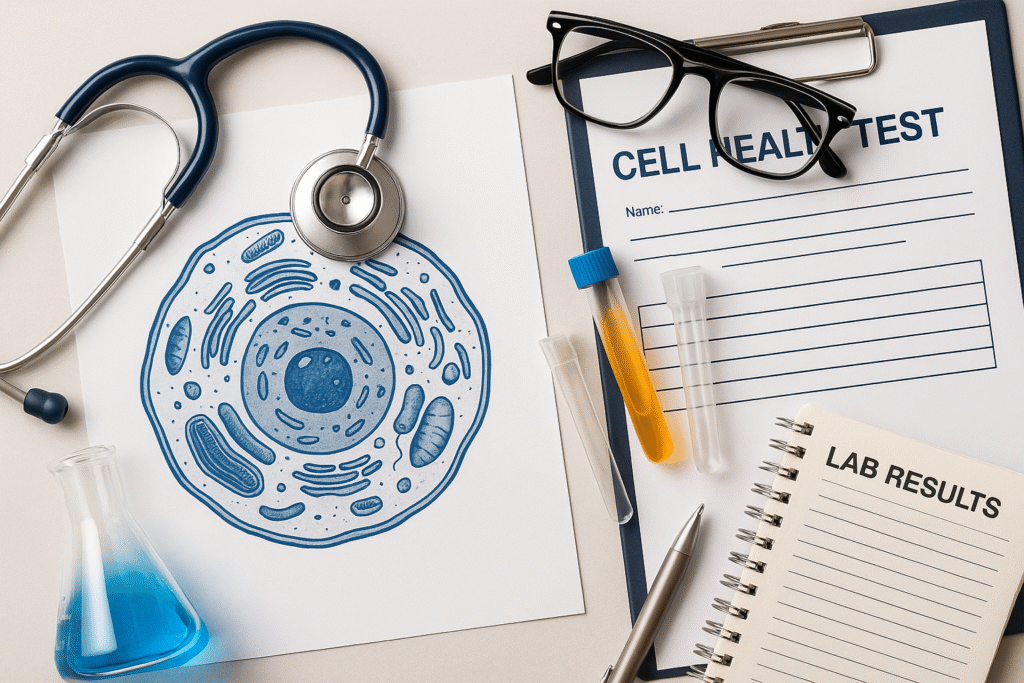How healthy are your cells really?
The health of our cells is the basis for vitality, performance and longevity. But how can you Measuring cell health? Today, modern laboratory medicine and functional diagnostics provide precise markers that show the state of your cell function, mitochondrial activity and detoxification capacity.
In this article, you will find out which biological markers provide information about your cell healthhow you interpret them - and what you can do to improve your cell function.
Why is cell health so important?
Cells are the smallest building blocks of the body - and their health affects all levels: Skin appearance, energy levels, immune system, hormones, ageing processes. Disturbed cell functions can go unnoticed for a long time before symptoms develop.
Early analysis of cell health is therefore a valuable tool in preventive medicine.
Measuring cell health: These markers are crucial
1. Mitochondrial function (ATP production)
The mitochondria are the "power stations" of the cells. An analysis of the ATP values, oxygen utilisation and cellular respiration shows how well your energy production is going.
Marker:
- ATP/ADP ratio
- mitochondrial membrane tension
- Oxygen radicals (ROS)
2. Oxidative stress & antioxidant system
Oxidative stress is caused by free radicals - an imbalance can damage cell structures and accelerate ageing processes.
Marker:
- Glutathione (GSH/GSSG)
- SOD (superoxide dismutase)
- 8-OHdG (DNA damage due to oxidation)
3. Cell membrane status & fatty acid profile
The cell membrane is essential for nutrient absorption, signalling and detoxification. A balanced fatty acid ratio (omega-3/6) is crucial.
Marker:
- Omega-3 index
- Cell membrane fluidity
- Phospholipid profile
4. Detoxification capacity (phase I & II of the liver)
Cell health depends heavily on the ability to eliminate toxins. A functioning detoxification system protects against chronic inflammation and cell damage.
Marker:
- Glutathione S-transferase (GST)
- Methylation status (e.g. homocysteine, SAMe)
- Liver transaminases (ALT, AST)
5. Cellular inflammation markers
Chronic, silent inflammation is a common cause of cell stress and premature ageing.
Marker:
- hs-CRP
- IL-6
- TNF-α
- NF-κB activation
How does a cell health analysis work?
Most of the markers can be set via Blood, urine or saliva analyse - partly also via innovative cellular function tests such as bioelectrical impedance analysis (BIA), intracellular micronutrient analyses or mitochondrial tests.
You can have individual values or comprehensive panels tested by specialised laboratories or holistic doctors.
Improving cell health - what to do?
If your analysis shows imbalances, you can take targeted countermeasures:
- Omega-3 fatty acids (algae oil, fish oil)
- Antioxidants (vitamin C, E, astaxanthin)
- Mitochondrial co-factors (CoQ10, NADH, B vitamins)
- Promotes detoxification (glutathione, broccoli sprouts, bitter substances)
- Nutrition, sleep, exercise and stress reduction
Conclusion: Measuring cell health - a key to prevention
Those who Measuring cell health you will gain deep insights into your biochemical processes - long before symptoms appear. With targeted analyses and holistic measures, you can Actively influence vitality, regeneration and healthy ageing.
